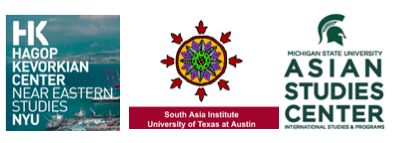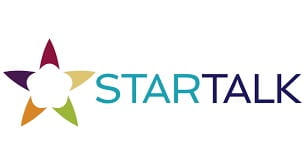(Co-funded by)
 May 25-June 30, 2024
May 25-June 30, 2024
NYU has been running this institute since 2008. This year our Online Hindi Urdu Teacher Training Institute is the result of a new partnership. It is funded by the Hagop Kevorkian Center, New York University, South Asian Institute, the University of Texas at Austin, the Asian Studies Center, and Michigan State University. The program awards a completion certificate for 50 hours to all participants who successfully complete the coursework. The Institute runs for 3 weeks for about 10 hours a week with one pre- and one post-program week about 10 hrs each. It emphasizes classroom teaching strategies and basic principles that can be applied to a variety of classroom settings. Participants develop engaging tasks in the three modes of communication in real-life and meaningful contexts with backward design. They design and demo- or micro-teach lessons with a focus on learner proficiency and background, use of the target language and making it comprehensible, and based on the use of authentic materials. Participants demonstrate their abilities through four key assessments:
- Peer-teaching of an activity (less experienced) or a lesson (more experienced)
- Authentic material based interpretive task
- Online micro-teaching lesson
- Presentation of three connected lessons (for less experienced) or a thematic unit (for more experienced) through ‘gallery walk’. Teachers are trained to apply and demonstrate their knowledge of the standards, specifically the communication and culture standards, effective instructional strategies, comprehensive input, and authentic materials to their diverse teaching settings for Hindi and Urdu.
The Institute recruits a total of 20 school, heritage school, or college teachers. Preference is given to applicants with teaching experience and native or near-native language proficiency with limited formal training. The curriculum is designed to be interactive and hands-on. Workshop facilitators model successful instructional techniques so that participants experience the methods and approaches that they need to implement in their own micro-teaching and teaching after the program. Participants engage in a number of learning activities online:
- viewing and examining lesson samples, classroom videos, student oral interviews
- selecting and evaluating authentic materials
- participating in discussions based on instructors’ prompts and presentations
- designing lessons, assessment tasks and activities based on templates and guidelines
- providing and receiving constructive feedback based on checklists
Time: 10 hours per week X 5 weeks (1-week preparation and 1-week follow-up review of teacher products and feedback) This program is sponsored by federally funded U.S. Title VI Centers and it provides a unique platform where Hindi and Urdu teachers work together and in varied groups to learn and apply the latest pedagogical skills, exchange experience and ideas relevant to the various classroom formats for teaching the two languages in the U.S. and beyond. Click the description for more details.
Click description for more details and scroll down to previous programs.
